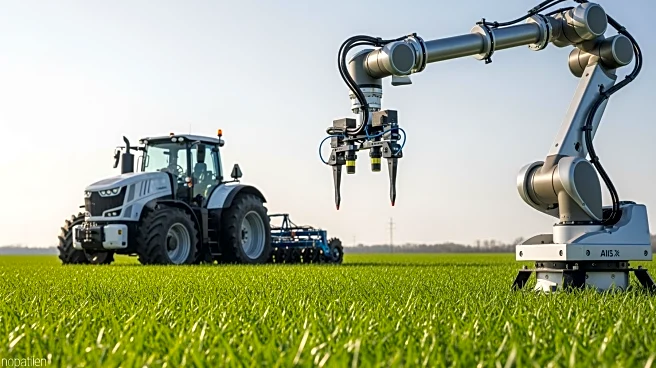What's Happening?
CNH is showcasing its latest technological advancements at the 2025 Tech Day held at Agritechnica, the world's largest agriculture tradeshow. The company is focusing on AI, autonomy, robotics, and automation to create a connected ecosystem that supports
farmers globally. CNH's innovations aim to enhance every phase of the crop cycle, from field preparation to harvesting, with technologies like Prescription Tillage, Planter Automation, and Sense and Act Spraying. These solutions are designed to improve productivity, yield, and sustainability, addressing the challenges of feeding a growing population with limited land resources. CNH's strategy includes nearly doubling Precision Tech sales by 2030, emphasizing the importance of AI in driving rapid innovation across its products and processes.
Why It's Important?
The advancements presented by CNH have significant implications for the agriculture industry, particularly in the U.S., where farming is a critical component of the economy. By integrating AI and automation, CNH aims to increase efficiency and sustainability in farming practices, potentially reducing costs and environmental impact. This could lead to higher yields and better resource management, benefiting farmers and consumers alike. The focus on connectivity and integration with third-party services also suggests a shift towards more collaborative and data-driven farming approaches, which could transform traditional agricultural practices and improve food security.
What's Next?
CNH plans to continue developing its technology portfolio, with upcoming launches like Passive Implement Guidance in 2026 and Green-on-Green Spraying in 2027. These innovations are expected to further enhance precision and efficiency in farming operations. The company's commitment to connectivity, including partnerships with satellite providers like Starlink, indicates ongoing efforts to ensure farmers have access to real-time data and support, even in remote areas. As CNH progresses towards its 2030 goals, stakeholders in the agriculture sector may need to adapt to these technological changes, potentially reshaping the industry landscape.
Beyond the Headlines
The integration of AI and automation in agriculture raises ethical and cultural considerations, such as the impact on labor markets and the traditional farming community. While these technologies promise increased efficiency, they may also lead to reduced demand for manual labor, necessitating workforce retraining and adaptation. Additionally, the emphasis on sustainability aligns with broader environmental goals, potentially influencing policy decisions and consumer preferences towards more eco-friendly agricultural products.















